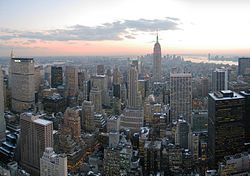Epi
Active Member
It's important to keep in mind that one of the many reasons why TC costs so much is because all the roads will be completely rebuilt. Some of these roads (i.e. Sheppard, Finch) are in pretty horrid shape and would probably have to be completely fixed up sometime soon anyway. I drive down these roads quite regularly and can tell you they are falling apart.
As well, they plan to add in some bike lanes in areas and make the sidewalks nicer too. All that costs a lot of money and while it is 'part of TC' it provide very tangible benefits to non-transit users as well.
As for the argument that LRT under Transit City will be no better than buses I find that silly. Transit City LRTs will have 4 times the capacity of a bus, with a much, much smoother ride. They will also allow all-door boarding which will vastly improve the speed spent at stops.
Because they won't have to be as close as running 4x as many buses, bunching will probably not happen except during the busiest time in rush hour many years from now when ridership catches up. Bunching vastly decreases the speed of buses, because at busy stops there's usually 1 person from each bus that has to get off anyway, and the bunching makes them wait in line to unload people. It's also much easier to get onto a low-floor LRT that comes right up to the station (so close you can wheel your wheelchair in). Buses can't do that reliably even the low floor ones especially when there's snowbanks. Buses also endlessly turn in and out of lanes and along with the general bouncyness of the bus they are really not that fun to ride in or stand in. All this adds to LRT being a vastly more reliable and better form or transit to use.
So even IF all the Transit City lines were JUST replacing buses for the sake of it, it leads to vastly better transit for riders. But it isn't. LRT under the Transit City model, because of the vastly larger vehicles, less dwell time due to no bunching and all-door loading and ROW implementation will also all vastly higher capacity than running buses would ever allow.
For those that say that 'real people don't care between LRT and bus' I beg to differ. Buses really are the worst form of public transportation. It's hard for the elderly to use because of the swaying/acceleration/deceleration/curbs/stairs, it's hard for those with strollers/wheelchairs, hard for those with any sort of physical disability to navigate it, and for anyone who actually gets carsick, a bus is 10x as bad and is something to be avoided at all costs.
As well, they plan to add in some bike lanes in areas and make the sidewalks nicer too. All that costs a lot of money and while it is 'part of TC' it provide very tangible benefits to non-transit users as well.
As for the argument that LRT under Transit City will be no better than buses I find that silly. Transit City LRTs will have 4 times the capacity of a bus, with a much, much smoother ride. They will also allow all-door boarding which will vastly improve the speed spent at stops.
Because they won't have to be as close as running 4x as many buses, bunching will probably not happen except during the busiest time in rush hour many years from now when ridership catches up. Bunching vastly decreases the speed of buses, because at busy stops there's usually 1 person from each bus that has to get off anyway, and the bunching makes them wait in line to unload people. It's also much easier to get onto a low-floor LRT that comes right up to the station (so close you can wheel your wheelchair in). Buses can't do that reliably even the low floor ones especially when there's snowbanks. Buses also endlessly turn in and out of lanes and along with the general bouncyness of the bus they are really not that fun to ride in or stand in. All this adds to LRT being a vastly more reliable and better form or transit to use.
So even IF all the Transit City lines were JUST replacing buses for the sake of it, it leads to vastly better transit for riders. But it isn't. LRT under the Transit City model, because of the vastly larger vehicles, less dwell time due to no bunching and all-door loading and ROW implementation will also all vastly higher capacity than running buses would ever allow.
For those that say that 'real people don't care between LRT and bus' I beg to differ. Buses really are the worst form of public transportation. It's hard for the elderly to use because of the swaying/acceleration/deceleration/curbs/stairs, it's hard for those with strollers/wheelchairs, hard for those with any sort of physical disability to navigate it, and for anyone who actually gets carsick, a bus is 10x as bad and is something to be avoided at all costs.
Last edited:











